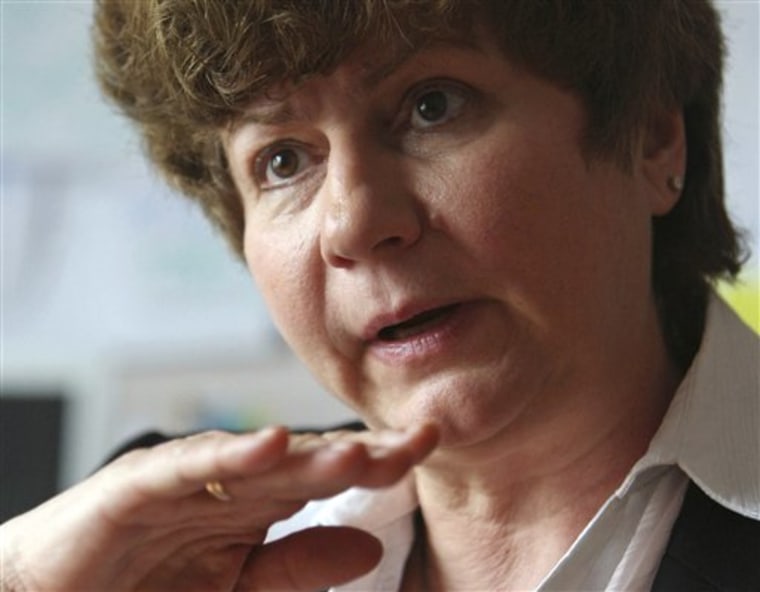A Russian lawyer said Wednesday she suspects she and her family were poisoned by mercury found in her car, keeping her away from the start of the trial of three men accused in the slaying of of one of her best-known clients, journalist Anna Politkovskaya.
Karinna Moskalenko, who has represented several Kremlin foes and is a lawyer for Politkovskaya's family, told The Associated Press she and her husband found balls of mercury in their car Sunday in Strasbourg, France. She said it may have been attempt to frighten her, but that it was unclear whether there was a link to the Politkovskaya murder trial.
"Somebody put it there, but I don't know who could have done it or what aims they were pursuing," Moskalenko said by telephone from Strasbourg, where she helps Russians take claims against the authorities to the European Court of Human Rights.
Several Russians who have criticized or angered the Kremlin — including Politkovskaya — have been victims of alleged poisoning attacks in recent years.
Politkovskaya fell seriously ill with food poisoning after drinking tea on a flight from Moscow in 2004, which prevented her from covering the hostage crisis in Beslan in which more than 330 people were killed. Former KGB officer and Kremlin critic Alexander Litvinenko died in Britain in 2006 after ingesting radioactive polonium 210, weeks after Politkovskaya was gunned down.
Meant to intimidate?
Moskalenko said she and her three children were feeling ill, and that one daughter had a temperature of 104 degrees. Ekho Moskvy radio quoted her as saying Tuesday that she and her children had experienced headaches, dizziness and nausea in recent days and had undergone tests at a hospital, receiving a preliminary diagnosis of poisoning.
"Thank God ... we are still alive," she said Wednesday as a child wailed in the background.
Colleagues and human rights groups said the incident was likely meant to intimidate Moskalenko.
"Karinna Moskalenko's poisoning is causing a great deal of anxiety and shock," said Anna Stavitskaya, who is also representing Politkovskaya's family. "Everyone — including me — thinks it is connected with her professional activity, as she is involved in several big cases."
A police official in Strasbourg confirmed the discovery of balls of mercury in Moskalenko's family car. The official said laboratory analyses found the mercury was not potent enough to cause injury or death, but the balls' mercury levels could have been greater prior to being shown to police.
The official said there was no sign the car had been broken into and investigators were searching for its previous owner. The official spoke on condition of anonymity, according to police policy.
Moskalenko said the idea that the mercury might have been in the car when her family acquired it was "total nonsense" because the car was given a thorough cleaning at the time.
She told the AP the mercury was on the floor of the car; the daily Kommersant cited her as saying it was beneath the front seats. "There was enough that it was very visible" once they found it, she told the AP.
Unsolved crime
Moskalenko has represented imprisoned former oil tycoon Mikhail Khodorkovsky as well as Garry Kasparov, the former chess champion and opposition leader detained last year during an anti-Kremlin protest.
She spends much of her time helping Russians press claims against the government at the European Court of Human Rights, which puts her at the forefront of challenges to Russia's international image.
Politkovskaya, whose reports on human-rights abuses in Russia and especially Chechnya embarrassed the Kremlin, was shot to death in her Moscow apartment building in 2006.
The trial that started Wednesday in a military court in Moscow is the first in connection with her killing. It has already been marred by the absence of the suspected triggerman and the failure to determine who was behind the slaying.
"The crime is not solved yet. Only a small fraction of the people involved are on trial now," Politkovskaya's son Ilya said outside the courthouse.
Journalists at risk
Stavitskaya said the trial judge refused her request to postpone the initial hearings until Moskalenko could come to Moscow, the ITAR-Tass news agency reported.
However, the state-run RIA-Novosti news agency cited a defense lawyer as saying the judge set the next hearing for Nov. 17.
Lawyers for victims' relatives often play a significant role in Russian trials.
Politkovskaya's slaying deepened Western concerns about Russia's course and underscored the risks run by independent Russian journalists. She was one of at least 13 journalists killed in contract-style slayings during Vladimir Putin's eight-year presidency. Few suspects have been prosecuted.
Prosecutors say the man accused of pulling the trigger, Rustam Makhmudov, has fled to Western Europe. The suspects being tried on murder charges are Sergei Khadzhikurbanov — a former Moscow police officer — and Makhmudov's brothers Ibragim and Dzhabrail.
A fourth man charged in the trial, Pavel Ryaguzov, is a Federal Security Service officer who is accused of criminal links with Khadzhikurbanov in an earlier case. He is no longer considered a suspect in Politkovskaya's killing, but his presence allows the trial to be held in a military court.
Prosecutors believe Khadzhikurbanov organized the killing, and that one Makhmudov brother followed the journalist and gave information on her movements to his brother, who then relayed those details to the shooter.
